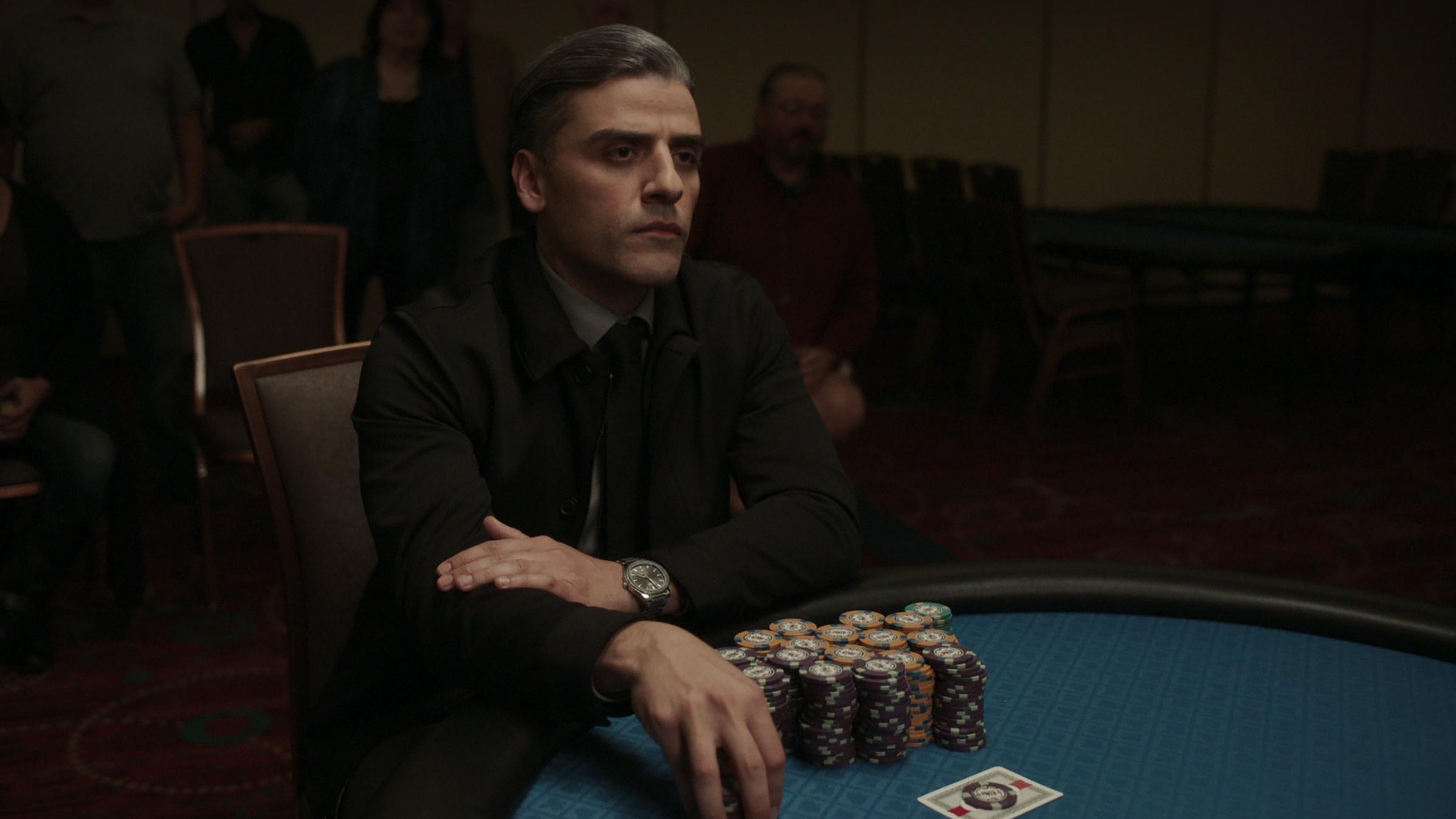The Card Counter deals Oscar Isaac a losing hand
Paul Schrader's greatest hits overshadow an inconsistent character study
Film Reviews The Card Counter

Paul Schrader has written this character before: a man alone with his thoughts, guilt, and self-hatred. He is monkishly devoted to his inner sickness, carrying out its little habits. He drives around aimlessly at night and prepares himself for oblivion in an ugly world. Travis Bickle of Taxi Driver, Schrader’s breakthrough screenplay, remains the most famous example—the definitive urban creep who gazes out of his Checker cab at the scum and pushers of the city. A less antisocial variation may be found in Frank Pierce, the hallucinating paramedic hero of the Schrader-scripted Bringing Out the Dead. More recently, in First Reformed, one of Schrader’s most accomplished works as a writer-director, there was Rev. Toller, the soft-spoken, alcoholic minister with a suicide vest in his room.
In The Card Counter, the character is William Tell (Oscar Isaac), real name Tillich, a professional gambler and, like Rev. Toller, a figure in black. As we learn at the beginning, he is both a veteran and an ex-con. His years in military prison were spent reading the classics and practicing cards. Now, he longs for regimentation. Traveling the country on a never-ending tour of small casinos, he plays blackjack for modest winnings and stays in cheap accommodations. In his motel room, he enacts a nightly ceremony, removing the pictures from the walls and wrapping the furniture in gray sheets and twine. He keeps a journal in which he expounds on cards and his philosophy of depression. It’s not clear why he writes—apart, of course, from the fact this is a favorite Schrader device.
Critics love to point out that Schrader was once one of our own. As First Reformed represented a conscious adaptation of the kind of art film celebrated in his book Transcendental Style In Film: Ozu, Bresson, Dreyer, so The Card Counter brings to mind another classic Schrader text. Published in Film Comment in 1972, “Notes On Film Noir” drew a parallel between noir’s late 1940s heyday and the already disillusioned ‘70s. Noir, Schrader wrote, was a genre of the American postwar experience, in which “the war continues, but now the antagonism turns with a new viciousness toward the American society itself.”
One can find issues with this analysis, but it has clearly reverberated across decades of Schrader screenplays, going back to Bickle, who was implied to be a Vietnam veteran. In The Card Counter, the connection to violence coming home is more explicit than usual. With his typical penchant for the grotesque, Schrader makes Tell one of the notorious torturers of Abu Ghraib, and thus a benumbed bearer of national shame. His nemesis on the card circuit is “Mr. USA,” a Ukrainian-born player with a flag-waving gimmick.
While plying his trade at a law enforcement convention (easy money, he informs us), Tell happens upon a seminar by his former superior, John Gordo (longtime Schrader regular Willem Dafoe), now selling himself as a high-tech security consultant for police departments. In the same room is Cirk (Tye Sheridan), a young man with a half-cooked plan to exact his own personal revenge on Gordo. In what initially seems like a twist on the usual Schrader formula, in which acts of violence become perverse self-destructive bids for redemption, Tell decides to take “the kid” under his wing. Accepting an offer from La Linda (a miscast Tiffany Haddish), an agent for a mysterious group of investors who back players in high-stakes games, he sets off on a poker tour, intending to give part of his winnings to Cirk so he can put him on the right path: Forget about Gordo, go back to college, call your mom.
It is, to be honest, not the most urgent of set-ups. In fact, the only thing really holding The Card Counter together is Schrader’s ritualization of the plot: the ascetic symbolism, the drinking, Tell’s celibacy, the usual issues with women. (The role of women in the Abu Ghraib case, however, is tellingly ignored.) There is, as usual with later Schrader films, an element of pastiche; Tell, with his black tie and professionalism, recalls the honor-bound hoods of Jean-Pierre Melville, the premier French interpreter of noir, whose Bob Le Flambeur may have provided some vague inspiration. But despite these and other echoes of moody and hard-boiled cinema, there is no sense of suspense or milieu.
The multicolored, packaged ostentation of the casinos seems to interest The Card Counter even less than it does the abstemious Tell: It’s one of Schrader’s least attractive works, with a cheaply digital look and a depopulated artificiality that brings to mind the worst tendencies of David Mamet, minus the twists and overwritten dialogue. Schrader, who is in his element when writing monologues and narration, is not one for patter, and his characters here have a habit of telling jokes that are as groan-worthy as they are old. The grace notes—including a final shot that could, potentially, be Schrader’s most sublime—are lost among the inconsistencies, incomplete subplots, and airlessness. It shouldn’t take an expert to figure out what a film is trying to articulate. Unfortunately, in this case, it does.
29 Comments
FIRST Reformed was an excellent movie
Yeah, it was – and way to spoil one of the best moments of it, Ig. I don’t mind as I’ve already watched it (several times), but for someone reading this article without having seen First Reformed, the mention of the suicide vest must be terribly annoying – and unnecessary.
I didn’t think there was anything wrong with Haddish’s performance… except that it belonged in a movie where any humor or liveliness was allowed.
That’s typically what people mean when they say someone is miscast; not an objectively bad performance but a poor fit for the movie.
I don’t think she was ‘bad’, but more that she wasn’t exactly evocative of the character. Maybe its my problem as a viewer that I hear comedy in her voice (though I love her more dramatic work in some of the dramadies she’s been in.) I read where Schrader initially thought she was wrong for the part as well, but she threw herself on his alter and asked him to remake her for the role. Not entirely successful.
I’m kinda 50-50 on Schrader’s work, so I’m always curious to see what he brings. I think performances have a lot to do with whether I will find his films powerful or not. Having said that, the guy made MISHIMA, which is a) one of my all-time favorites, and b) a staggeringly beautiful film…so who knows?
Still at a 95 percent RT.
correct me if i’m wrong but doesn’t that just mean 95% of critics have given it at least a c+?
A B-.
I believe the reviewers get to decide if its fresh or rotten, not based on a metric. That’s why there are some 2/4 reviews that are fresh and B- reviews that are rotten. They can let RT staff decide as well, but it’s up to the reviewer on how they approach it.That being said, RT is complete bullshit and means absolutely nothing in regards to the quality of a movie.
Also in the AV Club top 25 films of the year which suggests many of the other critics here quite liked it..(Doesn’t make IV wrong though, different people dig different stuff but yeah seems like this review ended up being somewhat a minority opinion)
Has Oscar Isaac ever been in a particularly good movie? I liked Inside Llewyn Davis and Ex Machina pretty well, but other than that…
Inside Llewyn Davis would be enough really, since it’s among the Coen’s top 5, but I’d add A Most Violent Year, To Eternity’s Gate and Drive to the list. He also headlined Show Me a Hero, which is both a great series and possibly his best performance.Dude’s very talented, but he has shit luck with the projects he chooses. Hopefully Metal Gear Solid and the Moon Knight series will help folks realize his particular energy.
I liked Annihilation, but realize that’s a polarizing film.
Seconding Show Me a Hero. Also, doesn’t count I guess since it isn’t out yet and his role is small but Dune is getting solid reviews. Scenes From a Marriage will probably be “good” in that it will be incredibly uncomfortable and unsettling watching two people emotionally destroy each other in a very visceral and depressing way. I wouldn’t be surprised if he and/or Chastain get some kind of recognition for it, but I’d rather claw the skin off my forearm than sit through it.
Dune’s coming next month.
I enjoyed A Most Violent Year but I couldn’t help thinking it was missing something that would’ve put it over the top. Great cast, interesting story… IDK just something.
The Last Jedi
…deftly portraying the inner turmoil of the hotshot pilot
…deftly portraying the inner turmoil of the hotshot pilot.
Ehm.
he’s also great in ‘a most violent year’.he’s been held back the last few years by star wars but he’s got a long, long career ahead of him.
Annihilation?
Definitely not Annihilation.
Don’t listen to this guy. Annihilation is great.
What a poor take on a film. Such a lazy review.
“He keeps a journal in which he expounds on cards and his philosophy of depression.” – What an embarrassingly ignorant sentence to write.If you don’t the understand the message in this film, just review movies that don’t require empathy. I almost feel bad for this reviewer. Another AV club miss. It may be the most reliable purveyor of poorly written reviews aside from the NY Post.
Aside from the review, if you don’t like Annihilation or Drive, I’m just unlikely to agree with your taste.
It’s kind of weird that a movie about poker is called The Card Counter since that’s a term used in blackjack not poker. There a ton of poker terms that they could have used.
>Traveling the country on a never-ending tour of small casinos, he plays blackjack for modest winnings
First Reformed was one of my faves the year it came out, and still stays with me – you can have a hell of a double feature about human tendencies towards self-destruction with “Annihilation”. It’s a shame that this seems a bit lesser, but probably still one to catch on streaming.
absolutely hated the final shot of this movie. Thought it was pretentious and hollow.